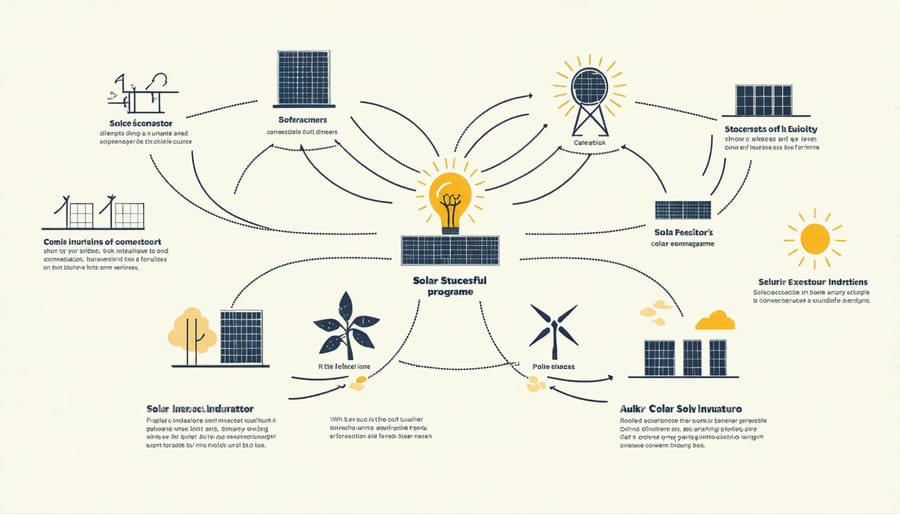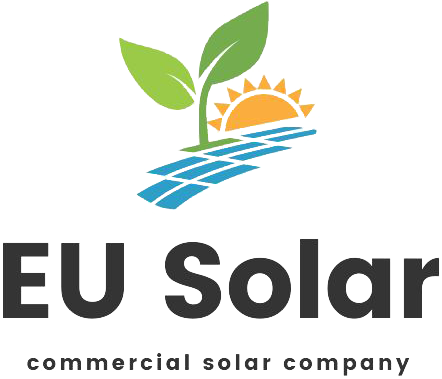Entrepreneurship incubator programs have emerged as powerful catalysts for transforming innovative ideas into successful businesses, particularly in technology-driven sectors where public-private partnerships in solar innovation are reshaping the industry landscape. These structured acceleration platforms provide crucial resources, mentorship, and funding opportunities that can significantly reduce the time from concept to market success. By combining intensive business development support with access to established industry networks, incubators have demonstrated their ability to increase startup survival rates by up to 87% compared to non-incubated ventures. For entrepreneurs navigating the complex journey from ideation to scalable business model, these programs offer a proven framework that addresses critical challenges in product development, market validation, and investor relationships. The most successful incubators leverage a combination of hands-on mentorship, strategic resource allocation, and industry-specific expertise to transform promising startups into market-ready enterprises positioned for sustainable growth.
The Power of Solar Energy Incubator Partnerships
Resources and Infrastructure Support
Incubator programs provide comprehensive infrastructure support designed to accelerate startup growth and development. The physical workspace typically includes modern office facilities, meeting rooms, and collaborative areas that foster innovation and networking. Many programs offer dedicated laboratory spaces and testing facilities equipped with industry-standard tools and equipment for product development and validation.
Technical resources often encompass high-speed internet connectivity, cloud computing services, and specialized software licenses that startups might otherwise find cost-prohibitive. Advanced prototyping facilities, including 3D printers and manufacturing equipment, enable entrepreneurs to rapidly iterate their designs and create proof-of-concept models.
Additionally, these programs frequently provide access to shared administrative services, including reception areas, mail handling, and office equipment. Many incubators also feature demonstration spaces where startups can showcase their products to potential investors and customers. The infrastructure typically includes secure storage areas, loading docks, and flexible workspace configurations that can adapt as startups scale their operations.
Some programs even offer specialized facilities such as clean rooms, environmental testing chambers, and data centers, depending on their industry focus and participant needs.

Funding and Investment Opportunities
Incubator programs typically offer diverse funding pathways to support emerging solar enterprises. Initial seed funding often ranges from $25,000 to $250,000, providing crucial early-stage capital for prototype development and market validation. Through strategic partnerships with venture capital firms and angel investor networks, these programs facilitate access to larger funding rounds, commonly ranging from $500,000 to $5 million for scaling operations.
Entrepreneurs benefit from structured guidance in developing effective solar investment strategies and pitch presentations. Many programs maintain relationships with industry-specific investors who understand the unique challenges and opportunities in renewable energy markets. Additionally, incubators often provide matching funds or help secure government grants specifically designed for clean technology initiatives.
Successful participants can leverage demo days and investor showcases to present their innovations to qualified investors. Some programs also offer convertible notes or equity-based funding options, allowing startups to access capital while maintaining operational flexibility during critical growth phases.

Key Components of Successful Solar Incubator Programs
Technical Expertise and Mentorship
Incubator programs excel in providing entrepreneurs with access to seasoned industry experts and technical mentors who offer invaluable guidance throughout the startup journey. These mentors typically bring decades of experience in business development, technology implementation, and market strategy, helping founders navigate complex challenges and avoid common pitfalls.
Technical support often includes access to specialized equipment, testing facilities, and research laboratories that would otherwise be cost-prohibitive for early-stage startups. Mentors work closely with entrepreneurs to refine their product designs, optimize manufacturing processes, and ensure compliance with industry standards and regulations.
The expertise provided extends beyond pure technical guidance to include intellectual property protection, certification processes, and quality control measures. Many incubators maintain partnerships with universities and research institutions, allowing entrepreneurs to tap into cutting-edge research and development resources.
Mentorship programs typically follow a structured approach, combining one-on-one sessions with group workshops and peer learning opportunities. Technical experts often serve as ongoing advisors, helping startups adapt their solutions to meet market demands and scale effectively. This comprehensive support system significantly increases the likelihood of successful commercialization and market entry.
Through these relationships, entrepreneurs gain not only technical knowledge but also valuable industry connections and potential customer introductions, creating a robust foundation for long-term success.
Market Access and Industry Connections
Successful entrepreneurship incubator programs provide invaluable market access opportunities through strategically cultivated industry connections. These programs typically maintain extensive networks of potential customers, investors, and strategic partners, offering startups direct pathways to market entry and business growth.
Incubators facilitate crucial introductions to industry leaders, creating opportunities for mentorship and corporate solar partnerships that can accelerate business development. Through organized networking events, trade shows, and industry conferences, startups gain exposure to potential clients and partners while building their market presence.
Many programs also provide access to market research databases, competitive intelligence, and industry reports that would otherwise be cost-prohibitive for early-stage companies. This market intelligence helps startups refine their value proposition and identify viable market opportunities.
Additionally, incubators often maintain relationships with government agencies, regulatory bodies, and industry associations, helping startups navigate complex regulatory requirements and access public sector opportunities. Some programs offer international market entry support through global partner networks, enabling startups to explore expansion opportunities beyond their home markets.
The collective bargaining power of incubator networks can also help startups secure preferential rates with suppliers, service providers, and distribution partners, reducing initial market entry costs and improving operational efficiency.
Real-World Success Stories
The transformative power of entrepreneurship incubator programs is best illustrated through the remarkable journeys of several solar energy startups that have emerged as industry leaders. One notable success story is Sunfolding, which joined the Powerhouse accelerator program in 2015 with an innovative solar tracking technology. Through the incubator’s support, they secured $32 million in funding and now deploy their systems across utility-scale solar projects nationwide.
Aurora Solar presents another compelling case, having graduated from Y Combinator’s clean energy cohort. The company’s solar design software platform streamlined the solar installation process, and with the mentorship and networking opportunities provided by the incubator, they grew from a small startup to a company valued at over $4 billion in just six years.
Enphase Energy’s journey through the Clean Tech Open incubator program demonstrates how targeted support can lead to industry revolution. Their microinverter technology, refined during their incubation period, has transformed solar installation efficiency. Today, Enphase is a publicly-traded company with a market capitalization exceeding $20 billion.
The success of SunRun, which participated in the California Clean Energy Fund’s incubator, showcases how proper guidance can help scale residential solar solutions. The company pioneered the solar-as-a-service model and has grown to become one of the largest residential solar installers in the United States, serving hundreds of thousands of customers.
Notably, Battery Smart’s experience in the Shell E4 incubator program highlights the international reach of these initiatives. The energy storage startup received specialized mentoring in manufacturing processes and supply chain optimization, leading to successful deployment of their technology across three continents within two years of graduation.
These success stories share common elements: access to specialized equipment and facilities, expert mentorship, and strategic networking opportunities provided by their respective incubator programs. Each company leveraged these resources to refine their technology, develop sustainable business models, and secure crucial funding for growth, demonstrating the vital role incubators play in advancing solar energy innovation.

Selecting the Right Incubator Program
Selecting the right incubator program is crucial for solar startups aiming to maximize their growth potential and market impact. When evaluating potential programs, entrepreneurs should first assess the incubator’s track record in the renewable energy sector, particularly their experience with successful solar innovation frameworks and technology commercialization.
Key factors to consider include the program’s industry connections, mentorship quality, and access to specialized equipment or testing facilities. Look for incubators that offer comprehensive support in areas such as regulatory compliance, patent protection, and certification processes specific to solar technology.
Financial considerations should extend beyond basic funding opportunities. Evaluate the equity requirements, resource allocation, and long-term partnership potential. Programs offering connections to venture capital networks and government grant opportunities can provide significant advantages for scaling operations.
Consider the geographic location and market focus of the incubator. Programs situated in regions with strong solar initiatives or renewable energy policies may offer better networking opportunities and market access. Additionally, examine the program’s duration and milestone expectations to ensure they align with your development timeline.
The ideal incubator should demonstrate a clear understanding of solar industry challenges and opportunities. Look for programs that provide access to industry experts, potential customers, and manufacturing partners. Their curriculum should address both technical advancement and business development, including market analysis, supply chain optimization, and sustainable scaling strategies.
Remember to evaluate the success metrics of previous participants and seek references from alumni companies in the solar sector. This due diligence will help ensure the selected program aligns with your venture’s specific needs and growth objectives.
Entrepreneurship incubator programs have proven to be vital catalysts in advancing solar energy innovation and market expansion. These programs have successfully bridged the gap between promising solar technologies and commercial viability, resulting in numerous breakthrough solutions that are now driving industry growth. By providing crucial resources, mentorship, and funding opportunities, incubators have helped launch hundreds of successful solar startups, many of which have become industry leaders in their respective market segments.
The impact extends beyond individual company success stories. Incubator programs have created robust ecosystems that foster collaboration between researchers, entrepreneurs, and industry stakeholders, accelerating the pace of solar technology advancement. Their support has led to significant cost reductions in solar equipment manufacturing, improved energy conversion efficiencies, and innovative business models that make solar energy more accessible to consumers and businesses.
Looking ahead, these programs will continue to play a crucial role in shaping the future of solar energy. As the industry evolves to meet growing demand for sustainable energy solutions, incubators will remain essential platforms for nurturing the next generation of solar innovations and entrepreneurs, ultimately contributing to a more sustainable and energy-efficient future.

